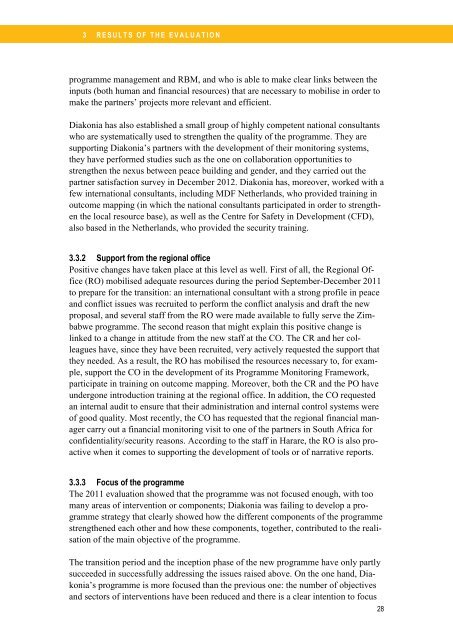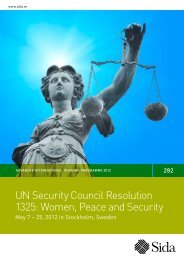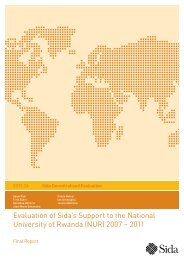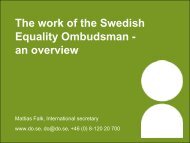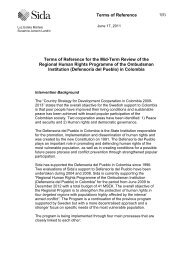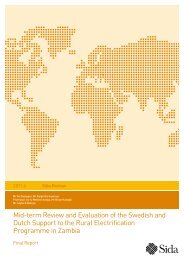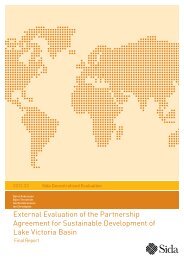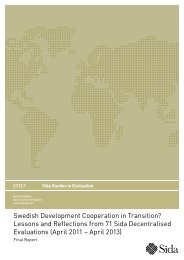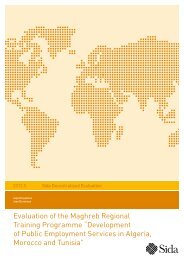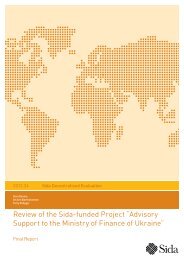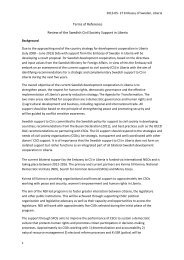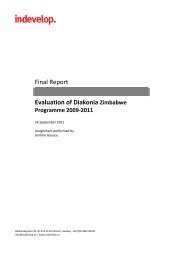Mid-term Review of the Diakonia Strategic Peace Building ... - Sida
Mid-term Review of the Diakonia Strategic Peace Building ... - Sida
Mid-term Review of the Diakonia Strategic Peace Building ... - Sida
You also want an ePaper? Increase the reach of your titles
YUMPU automatically turns print PDFs into web optimized ePapers that Google loves.
3 R E S U L T S O F T H E E V A L U A T I O N<br />
programme management and RBM, and who is able to make clear links between <strong>the</strong><br />
inputs (both human and financial resources) that are necessary to mobilise in order to<br />
make <strong>the</strong> partners’ projects more relevant and efficient.<br />
<strong>Diakonia</strong> has also established a small group <strong>of</strong> highly competent national consultants<br />
who are systematically used to streng<strong>the</strong>n <strong>the</strong> quality <strong>of</strong> <strong>the</strong> programme. They are<br />
supporting <strong>Diakonia</strong>’s partners with <strong>the</strong> development <strong>of</strong> <strong>the</strong>ir monitoring systems,<br />
<strong>the</strong>y have performed studies such as <strong>the</strong> one on collaboration opportunities to<br />
streng<strong>the</strong>n <strong>the</strong> nexus between peace building and gender, and <strong>the</strong>y carried out <strong>the</strong><br />
partner satisfaction survey in December 2012. <strong>Diakonia</strong> has, moreover, worked with a<br />
few international consultants, including MDF Ne<strong>the</strong>rlands, who provided training in<br />
outcome mapping (in which <strong>the</strong> national consultants participated in order to streng<strong>the</strong>n<br />
<strong>the</strong> local resource base), as well as <strong>the</strong> Centre for Safety in Development (CFD),<br />
also based in <strong>the</strong> Ne<strong>the</strong>rlands, who provided <strong>the</strong> security training.<br />
3.3.2 Support from <strong>the</strong> regional <strong>of</strong>fice<br />
Positive changes have taken place at this level as well. First <strong>of</strong> all, <strong>the</strong> Regional Office<br />
(RO) mobilised adequate resources during <strong>the</strong> period September-December 2011<br />
to prepare for <strong>the</strong> transition: an international consultant with a strong pr<strong>of</strong>ile in peace<br />
and conflict issues was recruited to perform <strong>the</strong> conflict analysis and draft <strong>the</strong> new<br />
proposal, and several staff from <strong>the</strong> RO were made available to fully serve <strong>the</strong> Zimbabwe<br />
programme. The second reason that might explain this positive change is<br />
linked to a change in attitude from <strong>the</strong> new staff at <strong>the</strong> CO. The CR and her colleagues<br />
have, since <strong>the</strong>y have been recruited, very actively requested <strong>the</strong> support that<br />
<strong>the</strong>y needed. As a result, <strong>the</strong> RO has mobilised <strong>the</strong> resources necessary to, for example,<br />
support <strong>the</strong> CO in <strong>the</strong> development <strong>of</strong> its Programme Monitoring Framework,<br />
participate in training on outcome mapping. Moreover, both <strong>the</strong> CR and <strong>the</strong> PO have<br />
undergone introduction training at <strong>the</strong> regional <strong>of</strong>fice. In addition, <strong>the</strong> CO requested<br />
an internal audit to ensure that <strong>the</strong>ir administration and internal control systems were<br />
<strong>of</strong> good quality. Most recently, <strong>the</strong> CO has requested that <strong>the</strong> regional financial manager<br />
carry out a financial monitoring visit to one <strong>of</strong> <strong>the</strong> partners in South Africa for<br />
confidentiality/security reasons. According to <strong>the</strong> staff in Harare, <strong>the</strong> RO is also proactive<br />
when it comes to supporting <strong>the</strong> development <strong>of</strong> tools or <strong>of</strong> narrative reports.<br />
3.3.3 Focus <strong>of</strong> <strong>the</strong> programme<br />
The 2011 evaluation showed that <strong>the</strong> programme was not focused enough, with too<br />
many areas <strong>of</strong> intervention or components; <strong>Diakonia</strong> was failing to develop a programme<br />
strategy that clearly showed how <strong>the</strong> different components <strong>of</strong> <strong>the</strong> programme<br />
streng<strong>the</strong>ned each o<strong>the</strong>r and how <strong>the</strong>se components, toge<strong>the</strong>r, contributed to <strong>the</strong> realisation<br />
<strong>of</strong> <strong>the</strong> main objective <strong>of</strong> <strong>the</strong> programme.<br />
The transition period and <strong>the</strong> inception phase <strong>of</strong> <strong>the</strong> new programme have only partly<br />
succeeded in successfully addressing <strong>the</strong> issues raised above. On <strong>the</strong> one hand, <strong>Diakonia</strong>’s<br />
programme is more focused than <strong>the</strong> previous one: <strong>the</strong> number <strong>of</strong> objectives<br />
and sectors <strong>of</strong> interventions have been reduced and <strong>the</strong>re is a clear intention to focus<br />
28


